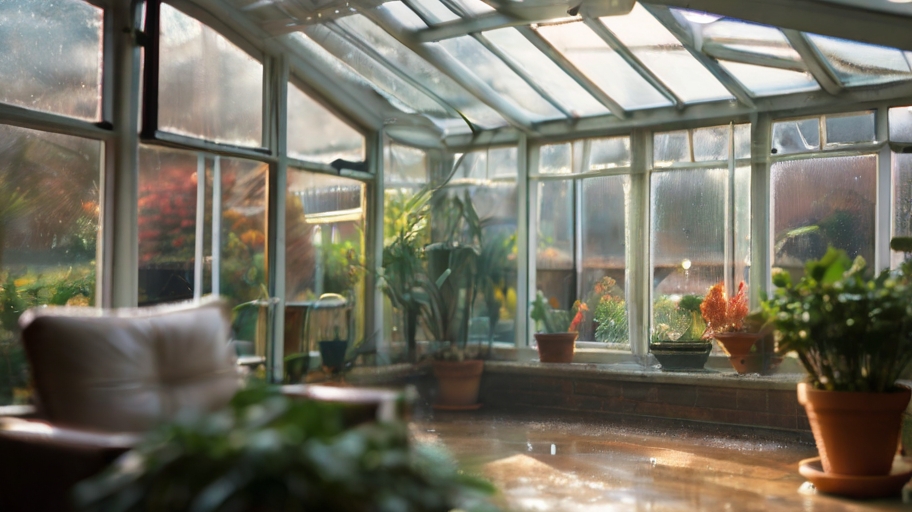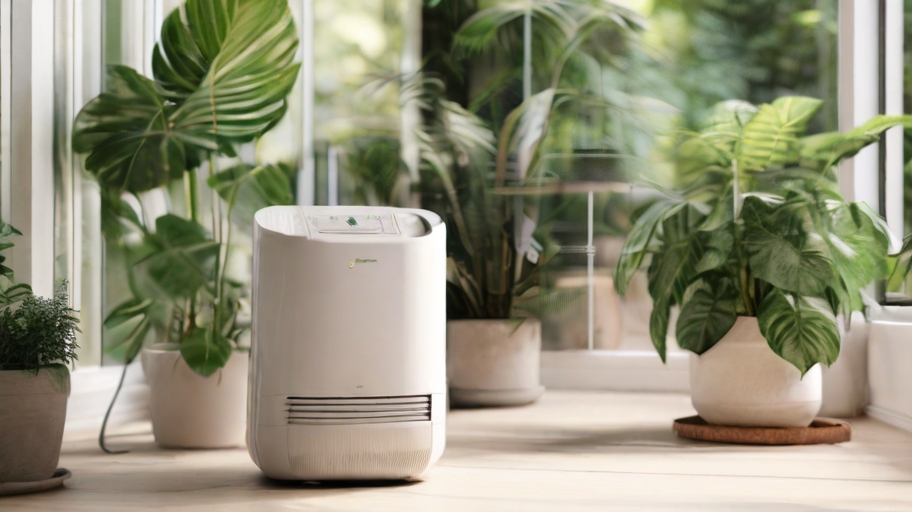Are you wrestling with chilly drafts and irritating condensation in your conservatory? Buying a dehumidifier could be your gold-winning move! But pause and reflect on – not all heroes wear the same cape. When choosing a dehumidifier for a cold conservatory, numerous factors are dancing around in a complex shimmy.
Should you opt for a desiccant or compressor dehumidifier? How much space does your conservatory have, and how energy-efficient do you want this device to be? Do the whispers of an optional heater catch your ear, or perhaps, do you fancy a model with an integrated hygrometer?
Liken baking the perfect cake, and your ideal dehumidifier becomes the pièce de résistance, with each decision adding a unique flavour to the result. Don’t let your modern conservatory transform into the North Pole; let it breathe easy with the right dehumidifier for your conservatory.
Exploring the Potential Harm of Conservatory Condensation

Warm air meets cold surfaces like the glass windows typically found in conservatories can lead to condensation, which, if left unaddressed, can cause significant harm. Excessive moisture in the air can create high humidity levels, providing an ideal environment for fungal proliferation and potential damage to the conservatory.
To prevent these issues, here are some needed steps to reflect:
- Utilise a dehumidifier specifically designed for conservatories. The dehumidifier works by drawing excess moisture, maintaining optimal moisture content and preventing the conditions that promote mildew spread.
- Ensure proper ventilation throughout the conservatory. By allowing the circulation of air, you can avoid the buildup of moisture and reduce the likelihood of condensation. Look at installing windows that can be opened or using ceiling fans to enhance air movement.
- Insulate your conservatory adequately. This major step minimises temperature differences between the warm indoor air and the cold glass surfaces, significantly reducing the chances of condensation forming on the windows.
- Manage indoor air quality by being mindful of activities that generate excessive moisture, such as cooking or showering, within the conservatory. These activities can contribute to increased wetness index and exacerbate condensation issues.
- Regularly inspect your conservatory for signs of damp or mildew growth. Promptly address any issues that arise, such as wiping away condensation or using appropriate cleaning methods for mould removal.
Is a Dehumidifier the Secret Ingredient to a Happy Conservatory?

Could a dehumidifier be the mystery elixir to restore joyfulness to your glass abode? Conservatories are enviable additions to any home. Their ability to invite in the sun and expose us to boundless views from the comfort of our furnishing is outstanding. However, they can be plagued by one recurring calamity: condensation.
This is where our redeemer, the dehumidifier, steps onto the stage. If you’ve been puzzled about how a dehumidifier works, it’s pretty nifty: it drains moisture from the air, thus helping to reduce humidity levels.
The Dehumidifier’s Modus Operandi: Employing the likes of a Meaco 12L Low Energy Dehumidifier within your conservatory may feel like procuring a secret weapon. This compact soldier combats that dreaded condensation where it occurs most—on your conservatory roof and windows. It’s not magic but science.
Refrigerant dehumidifiers, for instance, pull in moist air and cool it down to turn moisture into droplets (remember those science classes about condensation?), which then collect in a tank that needs to be timely emptied of water.
Your conservatory may feel chilly due to the cold air produced in the process, but the benefit of this whole operation is that it helps safeguard your furnishings and windows, making a more comfortable sanctuary. Plus, the cost of running these dehumidifiers is a small price to pay for preserving the harmony of your home.
So, while your conservatory’s blinds regulate sunlight, and your windows and doors maintain airflow, your trusty dehumidifier can help absorb unwanted moisture, striking a harmonious balance for your environment.
Can Dehumidifiers Give Results in Conservatory Environments?
If you’re looking to create a comfortable and healthy environment in your conservatory, a dehumidifier for conservatory can be the key to achieving the desired results. Here are five reasons why using a dehumidifier in your conservatory can be highly beneficial:
- Say goodbye to condensation: A dehumidifier effectively prevents condensation from forming on conservatory windows and walls, particularly in colder conservatories. By reducing excess moisture in the air, it tackles the root cause of condensation and helps keep your conservatory dry and clear.
- Bid farewell to mould and mildew: Excess moisture can lead to the growth of mould and mildew, which can cause significant damage to your conservatory’s walls, wood beams, and floors. By using a dehumidifier, you can effectively reduce the risk of mould and mildew growth, ensuring the longevity of your conservatory’s structure.
- Protect your wallpaper: High humidity can cause wallpaper to peel off, ruining the aesthetic appeal of your conservatory. With a dehumidifier, you can maintain optimal humidity, preventing wallpaper from peeling and preserving its pristine condition.
- Eliminate musty odours: Excess moisture often results in musty odours that can be quite unpleasant. A dehumidifier helps eliminate these odours by effectively reducing the humidity percentage, leaving it fresh and inviting.
- Manage nighttime condensation: Using a dehumidifier at night and leaving windows slightly open can help manage nighttime condensation. By controlling the moisture levels in your conservatory room, you can ensure a comfortable environment throughout the day and night.
Choosing the Right Size Dehumidifier: Finding Your Conservatory’s Dehumidifier Match
To guarantee optimal performance, you’ll need to select a dehumidifier that matches your conservatory’s size, considering factors such as energy efficiency, power consumption, and capacity.
The right size dehumidifier for your conservatory will be efficient in controlling atmospheric moisture and preventing dampness and mould growth.
Choosing the correct dimensions dehumidifier is required because a smaller unit may run continuously and still not lower the humidity level satisfactorily. Conversely, an oversized dehumidifier may cycle too often, leading to excessive wear and tear.
By finding your conservatory’s dehumidifier match, you optimise energy consumption and maintain the best conditions for your space.
The Best Dehumidifier For Your Conservatory

When you’re searching for the best conservatory dehumidifier, it’s binding to focus on specific features such as energy efficiency, dehumidification capacity, and the device’s compatibility with the size and conditions of your conservatory.
To stop condensation in a conservatory, a desiccant dehumidifier could be a great choice due to its ability to function at lower temperatures, a common feature of conservatories.
Here are some other features to think about when choosing the right dehumidifier:
- The dehumidifier’s capacity to manage humidity levels effectively.
- The ability to operate quietly, particularly if the conservatory is used as a living space.
- A dehumidifier with an auto-defrost feature to prevent freezing in colder conditions.
- The inclusion of a hygrostat for automatic control of humidity levels in your conservatory.
Remember to always inspect the conservatory roof’s insulation, as it affects humidity levels.
Uncovering Alternative Strategies to Tackle Conservatory Condensation
While choosing the proper dehumidifier is a key step in managing conservatory condensation, it’s equally important to explore other alternative strategies that can complement your device’s function and provide overall moisture control.
For instance, proper insulation can prevent the problem of condensation by reducing heat loss.
Ventilation is another factor; a well-ventilated conservatory can prevent condensation issues by allowing moisture-filled air to escape
Regular maintenance of your conservatory can also aid in managing condensation. By cleaning and inspecting the space regularly, you can spot and tackle condensation before it becomes a serious issue.
Combining these alternative strategies and also running a dehumidifier in the conservatory will ensure the highest level of moisture control.

